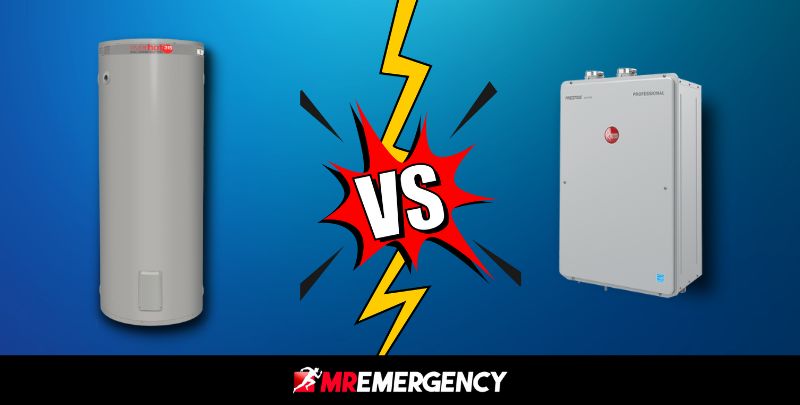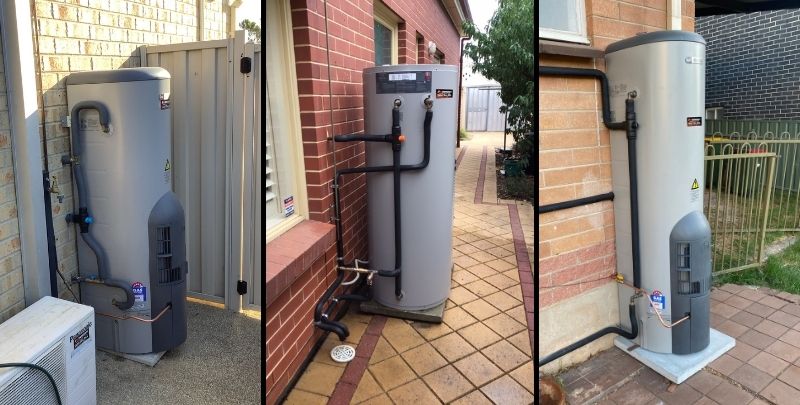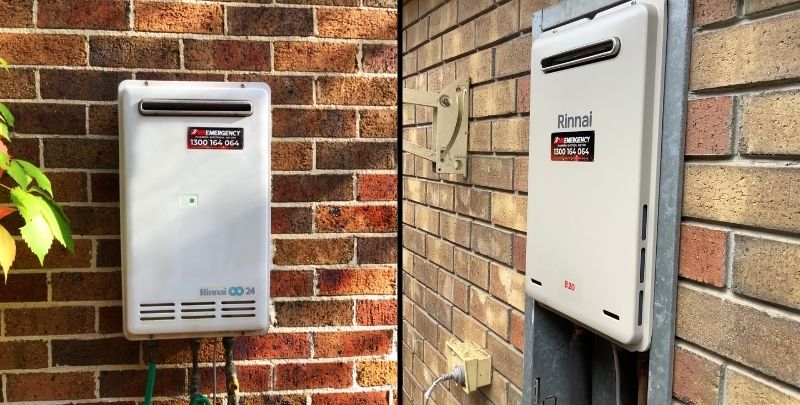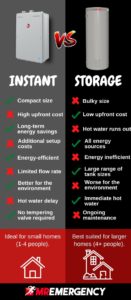
Instant vs Storage Hot Water Systems
Hot water is the second biggest contributor to your energy consumption, coming in at a whopping 25 per cent according to Energy Rating. The type of hot water system you have can have a major impact on your running costs and quarterly energy bill.
Nearly two-thirds of Australians have a traditional storage tank hot water system but another player is staking its claim as the preferred water heater in recent years.
Instantaneous hot water systems, also known as tankless or continuous flow water heaters, are gaining popularity across the nation and account for 25% of domestic water heaters.
We’re going to break down the instant hot water system vs tank debate, so you know which type is best for your home.
How Storage Hot Water Systems Work

Storage tank hot water systems are relatively simple in how they work. A cold water inlet pumps water from the mains into the tank. A gas burner or electric heating element inside heats this water to the set temperature. The tank is insulated so that heat loss is reduced and you have immediate access to hot water.
Sounds simple enough, but you can’t just heat a tank full of water and leave it at that. The first problem with this system is the building pressure from heating the water.
The solution? A pressure relief valve – whenever pressure inside the tank gets too high, water is pushed through this valve and escapes through the overflow pipe, relieving the pressure.
The second problem is the health concerns around storing water in a tank for long periods of time. Storage tank thermostats are set to 60°C to prevent the growth of bacteria.
This temperature, however, can scald you if you were to shower in it or wash your hands. To combat this, tempering valves must also be installed so that the water delivered to these fixtures is slightly cooled to 50°C.
Finally, how do we stop the tank from rusting from the inside out? Sacrificial anodes are installed inside the tank and are designed to preferentially rust instead of the tank. These need to be replaced every few years or so.
Now that we know how storage water heaters work, we can assess their pros and cons.
Storage Hot Water System Pros and Cons
Like all appliances in the home, there are positives and negatives you need to consider.
Con: Storage Tanks Are Bulky
A major downside to storage systems is that they are large, bulky and not aesthetic at all. This means they’re not always well suited to small homes with little yard space or for homeowners who are conscious about how their home looks, even down to the water heater.
Pro: Low Upfront Cost
Thanks to the simple operation of storage hot water systems, these units are not very costly to purchase, nor are they very expensive to have installed compared to other systems.
Con: Your Hot Water Can Run Out
If you’ve ever been the last one in a big family to shower in the morning, you’ll know this con all too well. A storage hot water system can only hold so much water at once, so once you run out, it needs to be refilled and that water needs to be heated again. This can take a few hours to happen, leaving you without hot water in the meantime.
Pro: All Energy Sources Are Available
Whether you’ve got access to natural gas or electricity, there’s a storage hot water system that can suit your needs. Gas hot water systems are the more efficient of the two energy sources, but not all homes have access to it.
Solar hot water systems are another great option for those after a more environmentally friendly alternative.
Con: Storage Tanks Are Energy Inefficient
Storage hot water systems will heat up the whole tank of water regardless of whether you need it or not. This means they can be incredibly inefficient when you don’t need all that hot water.
While these tanks are insulated, there is always going to be some heat loss and so this system will always be turned on and using energy to some extent. You can find the most energy-efficient storage tank by comparing the Energy Star Rating.
Pro: Large Range of Tank Sizes
Whether you’re a household of one or many, there’s a storage tank size that’ll meet your needs. You can find the perfect sized unit that will provide you with just the right amount of hot water without going over the top and wasting energy unnecessarily.
Con: Storage Systems Are Not Environmentally-Friendly
Given the energy inefficiency of these systems, it only makes sense that they’re not the most environmentally-friendly option too.
Pro: Immediate Hot Water
Storing hot water in a tank for immediate use does have its benefits. Having a storage hot water system means you’ll never have to wait for your shower water to heat up, it’ll come out hot right away. This means you’ll save time and even save water with your instant access to hot water.
Con: Require Ongoing Maintenance
The nature of storing hot water in a tank for the long term comes with a lot of challenges. In order to get the most out of your storage hot water system, you’ll need to keep up with regular, ongoing maintenance, ideally yearly.
This includes flushing out the system, replacing the anodes and more. With the right maintenance, you can expect a storage hot water system to last approximately a decade.
How Instantaneous Hot Water Systems Work

Instant hot water systems are becoming increasingly popular in Australian households. Much of this can be put down to their greater energy efficiency compared to storage types. Ultimately, this all boils down to how the system works.
Instead of heating and storing water in a tank all day, instant hot water systems supply hot water only as you need it. When you turn a hot water tap on, this triggers a flow sensor which turns on the electric heating element or gas burner.
Cold water is pumped through a heat exchanger where it is heated and then pumped to the fixture where the hot water tap has been turned on. So long as you’ve got the hot water tap on, water will be continuously heated. When you turn the hot water tap off, the flow sensor turns off and the heat exchanger stops heating the water. This means you’re only ever heating the water that you need.
Rather than storage capacity in litres, you’ll need to assess the flow rate of an instant hot water system to see if it is suitable for your home. This is the number of litres of hot water it is able to deliver per minute and can range from 10 to 32 litres per minute.
Instantaneous Hot Water System Pros and Cons
Only heating the water you need might sound like a dream, but instant hot water systems won’t work for every home. Here are the pros and cons of instant hot water systems you need to consider.
Pro: Compact Size
Say goodbye to that old, ugly and bulky storage tank! Instantaneous units are compact and mounted to your wall where they are largely out of sight and out of mind.
This makes the instant water heater the perfect choice for those with limited space or who are concerned with how their outdoor space looks.
Con: High Upfront Cost
There’s a bit more technology behind instant hot water systems when compared to storage water heaters. With this more advanced technology comes a higher upfront cost to purchase the unit, unfortunately.
Pro: Long-Term Energy Savings
While the upfront cost might be more, an instant hot water system is a worthwhile investment in your home. You’ll recoup the additional cost of the unit with the greater energy savings you’ll have in the long-term now that you only heat the water that you actually use.
Con: Additional Setup Costs
Switching from a storage tank system to an instantaneous one isn’t a simple like-for-like swap. Additional connections and power sources are often required which will be factored into the installation cost. So on top of paying more for the unit upfront, the installation cost will set you back more again.
Pro: Energy-Efficient
For energy-conscious homeowners, an instantaneous hot water system is a great option to add to your existing energy-efficient appliances. While solar hot water systems and heat pumps typically beat out instant water heaters as far as efficiency is concerned, they’re not always the best system in all cases.
Con: Limited Flow Rate
While storage tanks are limited by their tank capacity, an instant hot water system is limited by its flow rate. So long as the amount of hot water being used across your home at any one point doesn’t exceed your hot water system’s flow rate, you won’t have a problem.
When you’ve got two showers going at the same times as the dishwasher and washing machine, all using hot water at the same time, your hot water demand might exceed the system’s flow rate. This means not enough hot water will reach the fixtures and only lukewarm or cold water will come out.
Pro: Better For the Environment
With greater energy efficiency comes lower greenhouse gas emissions and negative environmental impact. You can feel better about your hot water usage when using an instant hot water system.
Con: Hot Water Is Delayed
One downside to the nature of instant hot water systems is that there is a small delay between turning the hot water tap on and hot water actually coming out of the fixture. This is because the hot water isn’t stored for ready use and the unit takes a moment for the water to heat up.
This means there is often a small amount of water wasted while you wait for the water to get hot.
Pro: No Tempering Valve Required
One benefit of using an instant hot water system is that there’s no water stored in the system. This eliminates the risk of bacteria growing in the water and means it doesn’t have to be stored at a temperature that would scald you. In turn, this means that there’s no need for a tempering valve as you can set the temperature directly on the hot water system itself.

What’s the Best Hot Water System?
There are a lot of factors that go into deciding what the best hot water system is for your home. As a general rule, instant hot water systems are ideal for smaller homes (1-4 people) where the hot water demand won’t exceed the flow rate.
Larger homes (4+ people) are generally suited to storage systems. Even the highest instant hot water system flow rates will likely struggle to meet the hot water demands in these homes. While you could install multiple instant water heaters to combat this, a single storage tank hot water system would likely be more efficient.
Even with the pros and cons of each system broken down, selecting the right system for your home can still be a challenge. When in doubt, contact your local plumbing expert.
Mr Emergency has hot water specialists available 24/7 who can help you choose the best new hot water system for your home. Give us a call today and we’ll have a hot water expert at your disposal in just 30 minutes*.
Please note: This information is provided for advice purposes only. Regulations differ from state to state, so please consult your local authorities or an industry professional before proceeding with any work. See our Terms & Conditions here.


